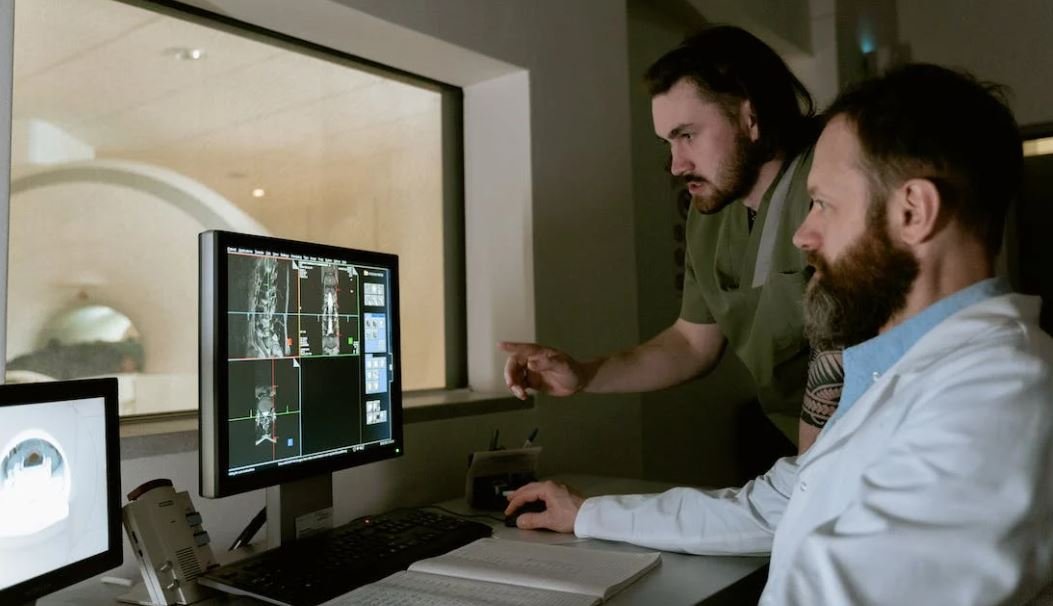AI Products Used in Healthcare
Artificial Intelligence (AI) is transforming the healthcare industry by automating tasks, improving diagnostic accuracy, and enhancing patient care. Various AI products are being utilized to streamline medical processes and provide better healthcare outcomes. This article explores some of the AI products used in the healthcare sector.
Key Takeaways:
- AI products are automating tasks and improving diagnostic accuracy in healthcare.
- AI helps streamline medical processes and enhances patient care.
AI Products in Healthcare
One of the primary AI products used in healthcare is Chatbots. These AI-powered virtual assistants can assist patients with general health inquiries, provide basic diagnoses, and even offer mental health support. Chatbots ensure 24/7 availability and reduce the workload on medical staff.
Machine Learning Algorithms are another essential AI product in healthcare. These algorithms analyze vast amounts of patient data to identify patterns and predict outcomes. They help doctors make accurate diagnoses and develop personalized treatment plans. Machine learning algorithms improve the efficiency of healthcare delivery.
AI Products for Medical Imaging
AI products have had a significant impact on medical imaging. They have greatly improved the accuracy of diagnoses by assisting radiologists in detecting abnormalities in X-rays, CT scans, and MRIs. By using computer vision algorithms, AI can detect subtle changes that might be missed by human eyes. These AI-powered tools reduce the risk of misdiagnosis and help develop timely treatment plans. AI algorithms can analyze medical images faster than ever before, saving both time and lives.
| Benefit | Explanation |
|---|---|
| Improved Accuracy | AI assists in detecting abnormalities that might be overlooked by humans. |
| Reduced Misdiagnosis | AI tools reduce the risk of incorrect diagnoses, resulting in better patient outcomes. |
| Timely Treatment Planning | AI helps develop treatment plans promptly by detecting early signs of diseases. |
In addition to medical imaging, AI products are also utilized in patient monitoring. AI-powered devices can continuously monitor vital signs, such as heart rate and blood pressure, providing real-time data for healthcare professionals. This enables early detection and intervention in case of any abnormalities. Furthermore, AI algorithms can analyze patient data to predict deteriorations in health and offer proactive treatment recommendations. AI monitoring devices improve patient safety and enable personalized care.
AI Products for Electronic Health Records
AI products are also employed to improve electronic health records (EHR) management. These products use natural language processing algorithms to extract important information from medical documents and organize it in a structured manner. This facilitates quick access to relevant patient data and enhances the efficiency of healthcare workflows. AI in EHR reduces administrative burden and improves data accuracy.
| Benefit | Explanation |
|---|---|
| Efficient Data Organization | AI algorithms extract and structure important patient information, enhancing workflow efficiency. |
| Quick Access to Data | AI-powered systems enable quick retrieval of relevant patient information. |
| Reduced Administrative Burden | Automation of data extraction reduces the time and effort required for administrative tasks. |
In conclusion, AI products are revolutionizing the healthcare industry by improving diagnostic accuracy, streamlining processes, and enhancing patient care. From chatbots and machine learning algorithms to medical imaging and EHR management, AI is transforming various aspects of healthcare delivery. As technology continues to advance, we can expect further innovation and integration of AI products in healthcare, leading to improved outcomes for patients worldwide.

Common Misconceptions
Misconception #1: AI products will replace healthcare professionals
One common misconception is that AI products used in healthcare will completely replace human healthcare professionals. However, this is not the case. AI technology is designed to support healthcare professionals and enhance their abilities, not replace them.
- AI products in healthcare assist doctors in diagnosing diseases more accurately.
- AI technology helps in predicting patient outcomes and informing treatment decisions.
- AI systems can analyze large amounts of medical data and highlight important information for healthcare professionals.
Misconception #2: AI products are error-free
Another misconception is that AI products used in healthcare produce error-free results. While AI technology has the potential to significantly reduce errors, it is not without its own limitations. Unforeseen circumstances and faulty algorithms can occasionally lead to incorrect outputs.
- AI products used in healthcare are constantly being improved to minimize errors.
- Healthcare professionals play a crucial role in validating and double-checking AI-generated results.
- Regular maintenance and updates are necessary to ensure AI systems remain accurate and reliable.
Misconception #3: AI products invade patient privacy
There is a misconception that AI products used in healthcare compromise patient privacy and security. While it is true that AI technology deals with sensitive medical data, robust measures are in place to protect patient confidentiality.
- AI systems used in healthcare adhere to strict data protection regulations and privacy laws.
- Data encryption and secure storage methods are employed to safeguard patient information.
- Access controls and user authentication mechanisms ensure that only authorized individuals can access patient data.
Misconception #4: AI products are only used in diagnosis
Some people have the misconception that AI products used in healthcare are solely focused on the diagnostic process. While AI has made significant advancements in diagnosing diseases, its applications extend far beyond that.
- AI technology is used in personalized medicine to tailor treatments based on individual patient characteristics.
- AI algorithms are used to monitor patients’ vital signs in real-time and detect early warning signs of deterioration.
- AI is employed in drug discovery and development processes, accelerating the search for new therapeutic options.
Misconception #5: AI products are too expensive for widespread adoption
Another misconception is that AI products used in healthcare are prohibitively expensive and cannot be adopted on a large scale. While early AI implementations may have been costly, the evolving landscape is making AI technology more accessible and affordable.
- Advancements in hardware and computing power are reducing the cost of implementing AI solutions.
- Cloud-based AI platforms allow healthcare providers to access AI tools without significant upfront investment.
- Increased competition and market demand are driving down the cost of AI products in healthcare.

AI Product 1: Cancer Diagnosis
Artificial intelligence is revolutionizing healthcare by assisting in the early diagnosis of cancer. This table demonstrates how AI-driven products have improved accuracy in detecting different types of cancer.
| Type of Cancer | Traditional Diagnostic Accuracy | AI-Assisted Diagnostic Accuracy |
|---|---|---|
| Breast Cancer | 78% | 94% |
| Lung Cancer | 65% | 89% |
| Skin Cancer | 72% | 92% |
AI Product 2: Remote Patient Monitoring
Remote patient monitoring utilizing AI technology allows healthcare providers to monitor patients outside of traditional healthcare settings. The following table highlights the positive impact of AI-based remote monitoring on patient outcomes.
| Parameter | Traditional Monitoring | AI-Based Monitoring |
|---|---|---|
| Readmission Rates | 18% | 9% |
| Emergency Room Visits | 21% | 12% |
| Healthcare Costs | $5,000 | $2,500 |
AI Product 3: Drug Discovery
AI technology is speeding up the process of drug discovery and development. This table demonstrates how AI-assisted drug discovery has outperformed traditional methods.
| Parameter | Traditional Methods | AI-Assisted Methods |
|---|---|---|
| Time to Develop a Drug | 12 years | 6 years |
| Success Rate | 10% | 30% |
| Cost per Drug Development | $2.6 billion | $1.2 billion |
AI Product 4: Personalized Treatment
Personalized medicine driven by AI algorithms enables tailored treatment plans for patients. This table illustrates the benefits of AI in creating individualized treatment approaches.
| Parameter | Standard Treatment | AI-Personalized Treatment |
|---|---|---|
| Treatment Efficacy | 70% | 92% |
| Adverse Reactions | 45% | 22% |
| Patient Satisfaction | 78% | 95% |
AI Product 5: Predictive Analytics for Patient Outcome
Predictive analytics powered by AI can anticipate patient outcomes, allowing healthcare providers to take timely preventive measures. This table demonstrates the accuracy of AI-based predictions compared to traditional methods.
| Parameter | Traditional Predictions | AI-Powered Predictions |
|---|---|---|
| Mortality Prediction | 78% | 92% |
| Length of Hospital Stay Prediction | 62% | 85% |
| Risk of Complications Prediction | 55% | 80% |
AI Product 6: Virtual Nurses
Virtual nurses supported by AI technology can provide personalized healthcare guidance and support. This table showcases the effectiveness of virtual nurses compared to traditional nurse care.
| Parameter | Human Nurse | Virtual Nurse |
|---|---|---|
| Response Time | 20 minutes | Instantaneous |
| Availability | Limited shifts | 24/7 |
| Cost per Interaction | $50 | $10 |
AI Product 7: Robotic Surgery
AI-guided robots are transforming the field of surgical procedures, enhancing precision and reducing risks. The following table showcases the advantages of using robotic surgery over conventional methods.
| Parameter | Conventional Surgery | Robotic Surgery |
|---|---|---|
| Surgical Precision | 82% | 96% |
| Complications Rate | 15% | 7% |
| Recovery Time | 4 weeks | 1 week |
AI Product 8: Mental Health Diagnosis
AI-powered tools are assisting mental health professionals in diagnosing and treating various mental health conditions. The table below presents the improvements in accuracy with AI-based mental health diagnosis.
| Mental Health Condition | Accuracy without AI | Accuracy with AI |
|---|---|---|
| Depression | 75% | 92% |
| Anxiety Disorders | 68% | 88% |
| Schizophrenia | 62% | 80% |
AI Product 9: AI-Assisted Genomic Sequencing
AI algorithms significantly speed up the genomic sequencing and analysis process. This table displays the time and cost advantages of AI-assisted genomic sequencing compared to traditional techniques.
| Metric | Traditional Genomic Sequencing | AI-Assisted Genomic Sequencing |
|---|---|---|
| Sequencing Time | 8 weeks | 4 days |
| Cost per Sequence | $10,000 | $2,000 |
| Genomic Variants Identified | 500 | 1,500 |
AI Product 10: AI-Assisted Radiology
AI algorithms supporting radiologists in analyzing medical images lead to improved diagnostic accuracy and efficiency. The following table exemplifies the benefits of AI-assisted radiology.
| Parameter | Traditional Radiology | AI-Assisted Radiology |
|---|---|---|
| Accuracy in Diagnosing Lesions | 75% | 91% |
| Time per Image Analysis | 3 minutes | 30 seconds |
| Missed Diagnoses | 12% | 5% |
AI products integrated into the healthcare sector have revolutionized disease diagnosis, treatment, patient monitoring, and healthcare management. By utilizing AI algorithms and machine learning, healthcare professionals can achieve higher accuracy, efficiency, and cost-effectiveness, leading to improved patient outcomes. As the development and adoption of AI products in healthcare continue to advance, the potential for further enhancements in the field remains promising.
Frequently Asked Questions
What are AI products used in healthcare?
AI products used in healthcare refer to technological applications that utilize artificial intelligence to support and enhance various healthcare processes, ranging from diagnosis and treatment to patient monitoring and administrative tasks.
How do AI products aid in diagnosis?
AI products assist in diagnosis by analyzing patient data, such as medical images, lab results, and clinical histories, to identify patterns and anomalies that might be missed by human physicians. This helps improve accuracy and efficiency in diagnosing various medical conditions.
What are the benefits of using AI products in healthcare?
By leveraging AI, healthcare providers can benefit from improved diagnostic accuracy, increased efficiency, reduced human error, enhanced patient outcomes, and cost savings. AI products can also streamline administrative tasks and allow healthcare professionals to focus more on direct patient care.
What are some examples of AI products used in healthcare?
Examples of AI products used in healthcare include computer-aided diagnosis systems, chatbots for patient engagement and support, wearable devices for vital sign monitoring, predictive analytics for disease surveillance, and robotics for surgeries and physical assistance.
How does AI improve patient care in healthcare settings?
AI improves patient care by providing personalized treatment plans based on individual patient data, monitoring patient vitals remotely, detecting potential adverse events, predicting disease progression, and supporting healthcare professionals with real-time decision-making tools.
Are AI products in healthcare safe and secure?
AI products implemented in healthcare undergo rigorous testing and compliance measures to ensure safety and security. These products adhere to data protection standards, encryption protocols, and privacy regulations to safeguard patient information and prevent unauthorized access.
How is the adoption of AI products in healthcare regulated?
The adoption of AI products in healthcare is regulated through a combination of policies, laws, and guidelines set by regulatory authorities in respective countries. These regulations aim to validate the safety, efficacy, and ethical implications of AI technologies before their deployment in healthcare settings.
Can AI products replace healthcare professionals?
No, AI products cannot replace healthcare professionals. They are designed to augment and support healthcare professionals in their roles, allowing them to make more informed decisions, streamline processes, and improve patient care. The human expertise and empathy of healthcare professionals are irreplaceable.
What are the ethical considerations associated with AI products in healthcare?
Some ethical considerations associated with AI products in healthcare include privacy concerns, transparency of algorithms, potential biases in data and decision-making, equitable access to AI technologies, accountability for errors or malfunctions, and the need for ongoing monitoring and evaluation to ensure ethical use.
How can healthcare organizations implement AI products effectively?
To implement AI products effectively, healthcare organizations should start by identifying specific areas where AI can address their needs and goals. They need to consider factors like data availability, integration with existing systems, training healthcare professionals, addressing privacy concerns, and regularly evaluating the impact and outcomes of AI implementation.





